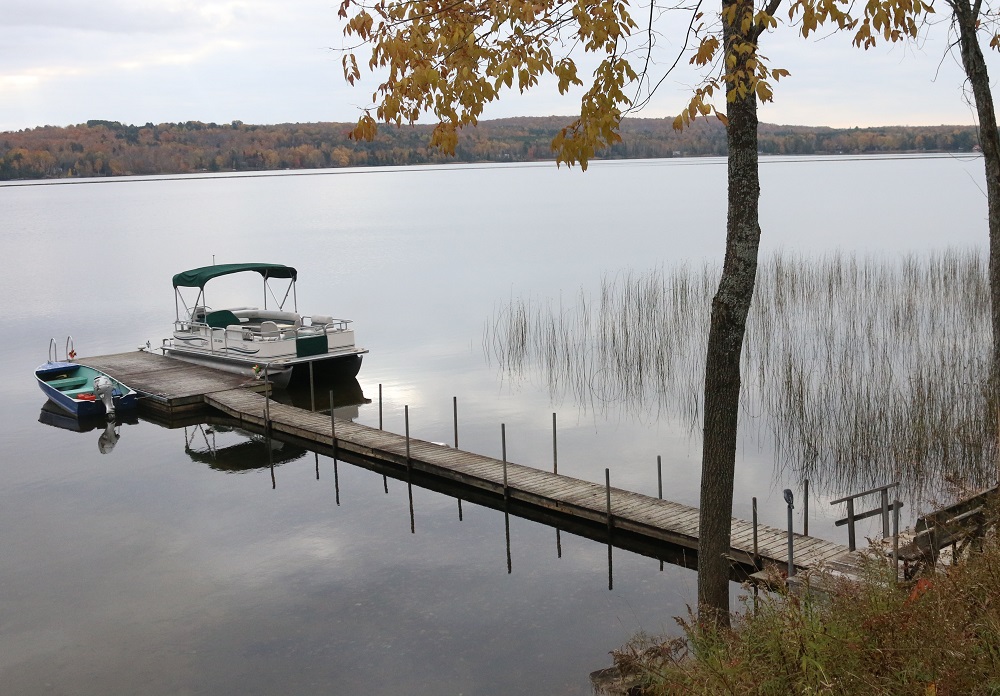Algonquin Highlands council has agreed to terms on a new license of occupation policy outlining rules for private dock registration on municipal property, with the legislation set to come into effect as of Jan. 1, 2024.
Following months of recent discussion, and years of consideration, the township’s elected officials supported the policy in principal Oct. 5. It calls for residents who own property across a municipal road from a waterbody, which has a dock or other infrastructure installed on township land, to register them.
Algonquin Highlands planner, Sean O’Callaghan, said the policy would protect the township from any liability, while enabling staff to keep accurate records of the number, and type, of structures located on municipal land fronting lakes.
The original proposal called for residents to pay a $750 application fee and provide a $2,500 deposit to cover any legal fees. It also required a site plan identifying the location and size of the docks and proof of insurance – first set at $5 million, but since reduced to $2 million. It was recommended licenses be renewed annually for $500.
Following criticism from some landowners, council came to something of a compromise at the meeting.
Coun. Sabrina Richards was concerned about the year one costs for those who would have to enrol, suggesting a lower annual renewal fee. Since he was unsure how much the program would cost, and council felt it was important to operate it strictly on a cost recovery basis, O’Callaghan suggested the $500 annual fee be maintained, at least for the first two years, with the possibility of it being lowered later.
Policies, once approved, will remain in place for 10 years, the planner said. Should someone sell their property within that window, and the new homeowner wish to maintain use of a waterfront area, they would have to reapply for a new license, O’Callaghan said.
To help offset the financial burden for good actors, coun. Lisa Barry suggested the township waive the $750 application fee for any property owner with existing structures who register in 2024. The fee would be for anyone who applies after that point, and for anyone looking to install a new structure. Council unanimously supported the amendment.
Council established a two-year window for registration, giving everyone until Dec. 31, 2025 to secure a license. Any unlicensed structure still in place by 2026 will be removed, O’Callaghan said.
“Giving people two years to enter into a license is very reasonable,” O’Callaghan said.
Concerns levelled
James Cooper and Logan Percy, who own impacted properties on North Shore Road, told council at the meeting they would not comply with the policy in its current format, and would be recommending members of the Haliburton County Landowners Association – recently established to combat the policy – follow suit.
James Cooper and Logan Percy, who own impacted properties on North Shore Road, told council at the meeting they would not comply with the policy in its current format, and would be recommending members of the Haliburton County Landowners Association – recently established to combat the policy – follow suit.
Cooper also took umbrage with O’Callaghan’s assessment that the township would reserve the right to terminate any license of occupation at any time at its own discretion.
We asked for documented guidelines for scenarios where the township can revoke a license, the response was… guidelines will not be developed,” Cooper said. “Without guidelines, anyone who signs this agreement effectively has little to no rights.
“There’s no appeal process, no tribunals, no lawsuits, nothing. You’ve covered yourself in a way that says if there’s any disputes, there’s no recourse for us… Because we’re the ones putting out significant funds, we want to make sure we get this right,” Cooper added.
O’Callaghan said it would be difficult to establish a standard list, noting there’s no one size fits all approach that would cover all properties. He outlined lack of payment and issues with the building code as two reasons for possible termination.
Percy wanted to know if applicants would have exclusive use of waterfront areas upon registration. O’Callaghan said that was the intent, but he was unsure whether that could be enforced. He committed to bringing an answer back to council at a future meeting.
Paying a fair share
Percy also took exception to prior comments made by Danielsen indicating homeowners like him were not paying their fair share for their docks.
“MPAC does assess us as waterfront residential, our properties are bought and sold at waterfront pricing, and Algonquin Highlands taxes us accordingly… we pay similar amounts in tax per year as all equivalent waterfront properties, so we are paying our fair share and always have been,” Percy said.
He opined if this policy were to come into effect, the approximate 350 landowners impacted would be paying more in taxes and fees, by percentage, than any other ratepayer in Algonquin Highlands. Danielsen expressed her belief Oct. 5 that this was untrue. She also shut down calls from Cooper and Percy to set up a meeting with MPAC, the body responsible for determining property values for taxation purposes.
“I don’t see that helping at all,” Danielsen said.
The mayor did admit the township “jumped the gun a little bit” in trying to establish the license without rolling out an extensive educational program, noted as a key priority in discussions over the years. She thanked Percy and Cooper for the work they had done on the file.
“In some ways you’ve forced our hand… we’ve gone a lot further with respect to education and we should have done that earlier,” Danielsen said.
O’Callaghan said he would provide answers to outstanding questions and bring the policy back for official adoption in November.





